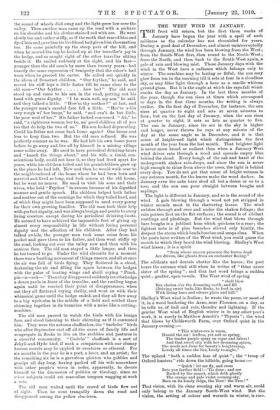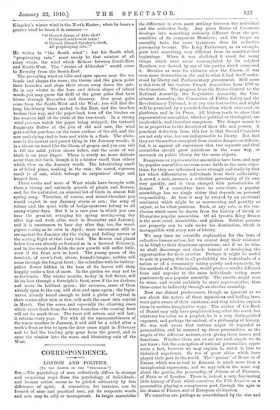THE WEST WIND IN JANUARY.
THE frost will return, but the first three weeks of January have begun the year with a spell of such mildness as the calendar has not chronicled for years. During a good deal of December, and almost-uninterruptedly through January, the wind has been blowing from the West ;
from the South-West first, then round to the North-West ; from the North, and then back to the South-West again, a gale of rain and blowing mist. These January days with the wind in the West have a radiance which belongs only to winter. The sunshine may be lasting or fitful; the sun may glow from ten in the morning till it sets at four in a cloudless sky, or may filter light through a haze as a candle whitens ground glass. But it is the angle at which the rays fall which marks the day as January. In the last three months of the year, though the sun rises at times which correspond to days in the first three months, the setting is always earlier. On the first day of December, for instance, the sun rises at quarter to eight and sets at seven minutes to four ; but on the last day of January, when the sun rises at quarter to eight, it sets as late as quarter to five. The sun in January, since its arc in the sky is higher and longer, never throws its rays at any minute of the day at the same angle as in December, and it is that sense of heightened light which distinguishes the first month of the year from the last month. That brighter light is never more broad or radiant than when a January West wind drives rain through a wood and spreads empty blue behind the cloud. Every bough of the oak and hazel of the undergrowth shakes rain-drops, and since the sun is never high enough to shine from above the trees, the light is behind every drop. You do not get that sense of bright wetness in any autumn month, for the leaves make the wood darker. In January even the oaks have shed all but a dozen or so to a tree. and the sun can pour straight between boughs and saplings.
The light is different in January, and so is the sound of the wind. A gale blowing through a wood not yet stripped in winter sounds most in the • chattering leaves. The wind swishes through and over and under the shaken foliage ; the rain patters first on the flat surfaces ; the sound is of sibilant rustlings and plashings. But the wind that blows through bare boughs is a jubilant hum which quickens to a roar ; the lightest note is of pine branches stirred only faintly, the deepest the storm which bends beeches and snaps elms. When the poets have written of the West wind, you could guess the month in which they heard the wind blowing. Shelley's West wind hisses ; it is a spirit
"from whose unseen presence the leaves dead Are driven, like ghosts from an enchanter fleeing."
The sibilants and dentals chatter like the leaves ; the poet hears the autumn wind still when he writes of "thine azure sister of the spring " ; and that last word brings a sudden quiet ; gentler, open vowels. The West wind of spring
" shall blow
Her clarion o'er the dreaming earth, and fill (Driving sweet buds, like flocks, to feed in air) With living hues and odours plain and hill."
Shelley's West wind is Italian ; he wrote the poem, or most of it, in a wood bordering the Arno, near Florence, on a day, as he tells us, of hail and rain, thunder and lightning. If the gentler West wind of English winter is in any other poet's work, it is surely in Matthew Arnold's " Thyrsis "; the wind that blows by Childsworth Farm, over Oxford quiet in the January evening :—
" This winter-eve is warm,
Humid the air ! leafless, yet soft as spring, The tender purple spray on copse and briers !
And that sweet city with her dreaming spires, She needs not June for beauty's heightening, Lovely all times she lies, lovely to-night."
The upland "hath a sudden loss of quiet "; the "troop of Oxford hunters " ride down the hillside, going home:—
"Quick! let me fly, and cross
Into you farther field !—'Tis done ; and see
Backed by the sunset, which doth glorify The orange and pale violet evening-sky, Bare on its lonely ridge, the Tree ! the Tree !"
That vision, with its clear evening sky and warm air, could only belong to the January South-West wind. But the vision, the setting of colour and warmth in winter, is rare. Kingsley's winter wind is the North-Easter ; when he hears a gentler wind he hears it in summer :—
" 0 blessed drums of Aide: shot!
0 blessed south-west train!
0 blessed, blessed Speaker's clock, All prophesying rain!"
He writes to "the South wind " ; but his South wind, "prophesying rain," must surely be that rainiest of all rainy winds, the wind which flickers between South-East and South-West. The " drums of Aldershot" would come to Eversley from the South-East.
The prevailing wind on bills and open spaces near the sea bends and shapes the trees ; the thorns and the pines point their branches and slope their stems away down the gale. So in any winter in the hare and driven slopes of inland woods you may guess the drift of the great gales that have blown through December and January. Our great gales come from the South-West and the West; you will find the long blackberry blues arched to the East, and the bracken broken that way, and the paper-bark torn off the birches on the western half of the circle of the tree-trunk. In a strong wind you can watch the paper being stripped; the tattered fragments flutter at the join of old and new, the wind gets sudden purchase on the inner surface of the old, and the new underlying rind is bare and white in a flash. The white- ness is the newest and purest thing in the January-woods; it is a bloom on wood like the bloom of grapes, and you can rub it till the solid yellow shows below, and the scent of wet birch is on your finger. . There is surely no more delicate scent than wet birch, though it is a fainter smell than others which blow on the January winds. The intoxicating smell is of felled pines, soaking in the rain ; the sound, vigorous smell is of oak, which belongs to carpenters' shops and heaped fires.
Three weeks and more of West winds have brought with them a strong and untimely growth of plants and flowers, and, for the naturalist, an unusual list of birds in almost full spring song. Thrushes, of course, and missel-thrushes you would expect in any January storm or sun ; the song of robins and the quiet trills of hedge-sparrows belong to all sunny winter days. But it is a rare year in which you can hear the great-tit swinging his spring mating-song day after day and week after week in December and January, and it is uncommon to hear day after day, too, the wood- pigeon cooing as he coos in April ; more uncommon still to see against the January sky the rising and falling curves of the mating flight of that lusty bird. The flowers and plants below him are already as forward as in a forward February, and in the woods and fields the new growth will suffer little, even if the frost sets in hard. The young green of the hemlock, of crow's-foot, clover, hound's-tongue, nettles will come through the longest frost ; the celandine with its buttery- yellow flower hidden in the base of its leaves will sleep happily under a foot of snow. In the garden we may not be so fortunate. The winter aconite, to-day in full flower, will do its best through a fortnight's frost, even if the ice darkens and scars its brilliant green ; the crocuses, some of them already open to the sun, will shut and open again ; the lupin- leaves, already broad enough to hold a globe of crystal in their centre after rain or dew, will melt the snow into crystal in March. But the roses, and especially the climbing roses which shoot fresh from the lower branches—the coming frost will set its mark there. The frost will return, and will last; it returns every year. Yet with all the unseasonableness of the warm weather in January, it will still be a relief after a week's frost or less to open the door some night in February and to feel the binding grip gone from the gravel, and to open the window into the warm and blustering rain of the West.







































 Previous page
Previous page